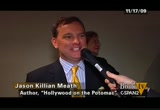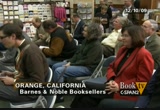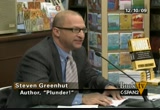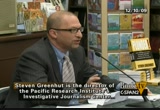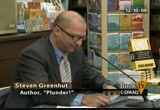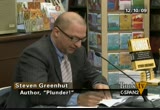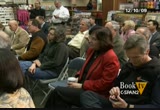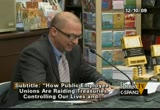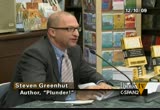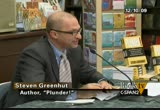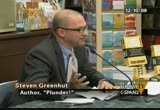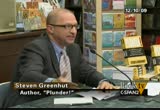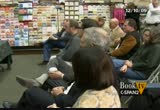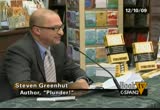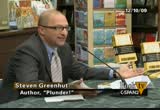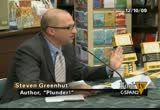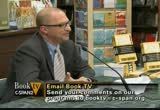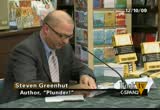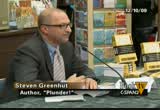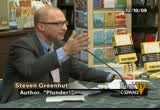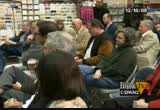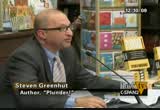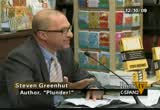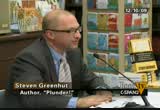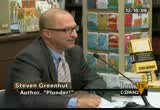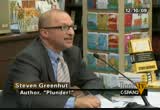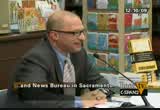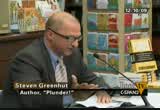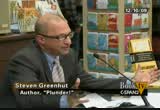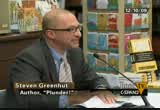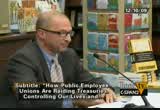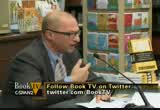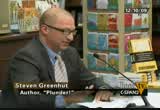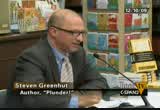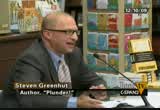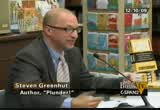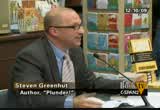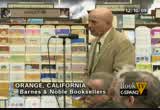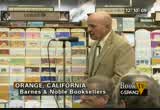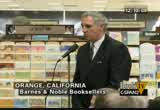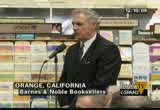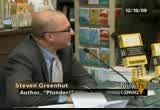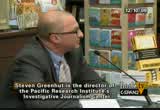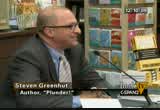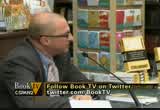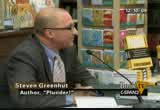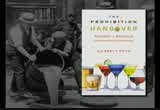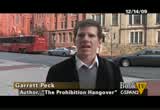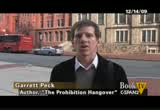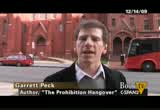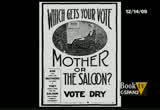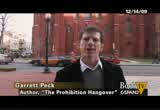tv Book TV CSPAN January 3, 2010 9:00am-10:00am EST
9:00 am
do you ever tell your clients to invoke a celebrity endorsement? >> no, i really stay away from that. but, you know, we live sort of in the anal where obama -- age where obama and oprah were a team and mike huckabee and chuck norris were a team, so it doesn't matter whether whether you're democrat or republican, i think both sides are very involved with hollywood and celebrity. >> jason killian meeks, author of "hollywood on the potomac." thank you so much. >> journalist stephen greenhut takes a critical can look at government workers and the unions that represent them. he argues that government employees have become a huge drain on government course. barnes & noble is the host of this event, it's about 50 minutes. ..
9:01 am
>> when the government fears the people, there is liberty. and that's another thing in the book. it's not just about -- pension liabilities in the financial cost in the financial burdens, it's about a class of people who have come to control us in many ways. and i find increasingly that we are fearing the government officials, and in a free society it should be the other way around. i'm in sacramento now.
9:02 am
i'm starting in investigative journalism program and news burrell for the pacific research institute, think tank, based in san francisco. were going to be starting a watchdog program with the beginning of the california legislature, the new session in early january. the whole idea is to keep an eye on government and to give and not on the unions that control sacramento. and i've been at the orange county register for 11 years, and i still write a column for them and i've covered government down here in orange county. but now that i'm up in sacramento, the capital city, i don't know, i thought i would head up this, it's a nice city but really a government city. by the way, i'm not to worry that i'm not going to have enough to write about given how well run, efficient california government is. but one of my days in the capital, i'm driving from my apartment to downtown, and all around the city are these yard
9:03 am
signs on the union, state employee and proud of it. that just remind you a lot of the people who live in the city are government employees, union members, and they're quite proud of it. then i got into work and i couldn't get my city run parking pass to work in the city rangarajan had to go to city hall, wait in line. people were nice, but that kind of surprised me. but as this bureaucracy, then i headed to the post office where the post office in downtown sacramento, you have to go through security gates to go to the post office to mail a letter. so there are three security guards standing there putting my stuff through an x-ray machine. and i waited in line, and i told the clerk that i wanted to get a post office box because i'm in the middle of moving. and he wouldn't give it to me because i needed to current address identifications to get a post office box, which i explain to him, if i had to current
9:04 am
identifications, if i had an address i wouldn't need a post office box. anyway, my point for relating these silly stories, i'm not afraid where becoming slaves, i'm afraid that we're becoming a nation of people who wait in line and follow the these english rules. and that this whole machinery of government is run by a bunch of caudal class of workers who retire at age 50 with 100,000-dollar pensions. that's the kind of world i think we are creating, in the book, those are kind of life examples. but my book goes into some of the real series examples, financial examples, this update is how a public employees are rating treasures, controlling our lives. they really have a lot of control, especially, these are government employees have a lot of control over our everyday lives. and they are bankrupting the nation. we can't afford to continue to
9:05 am
do what we're doing. that's my big concern. the old deal was government employees, they get lower pay, right, but they get somewhat better benefits and more job security. that was the old deal. i don't think they're a quite so many government workers either when that old deal was in place. the new deal is they retire with very large salaries, often $100,000 or more. marcia fritz in her california foundation for fiscal responsibility, has a 100,000-dollar pensions love. in california is more than 10000 people. there are a heckuva lot more that are close to that. so that's the new deal, and they get cost-of-living adjustments. they get free health care, free, courtesy of the taxpayers. and they get better pay. especially federal employees who get much better pay. so that's the new deal. that's a troubling new deal. plus they get fewer working hours. i know a lot of officials,
9:06 am
especially police agencies, have their three-12 work schedules. they work fewer days because of stress. that was the excuse, we can work as many days because of all the stress from our job. than they have all these days offer so what do they do, they work overtime. and in orange county, that just pushed a lot of deputies sounds up to 150,000 in more. a typical deputy because of overtime gets $100,000. and other agency, try going to city hall on a friday, your city hall. they're often close on fridays, or every other fridays. that's because of the deals given to these public employees. they get more time off. so they get everything. they get more time off. they get more paid holidays. plus they get special protection, and that's another theme in the book, the special protections are very troubling. for instance, consider the ironclad job security public
9:07 am
employees have. and often, they get to feel superior to us also. i was reading -- california, the state legislature has passed a special week celebrating public employees, the example use in my book i wrote about as a kid i said to my mom, on mother's day i think it was, i said how come there's no children's day? and she started laughing at and i pressed her for it, and she said the reason there's no children date is every day his children stay. we don't need special weeks celebrate public employees because every day is public employee day. they get it all, and i'm looking at a couple of public employees who are smiling. but there is a certain truth to that. by the way, the government is still hiring, despite -- in the public sector is getting obliterated in this bounty to. people are laying off and cutting salary.
9:08 am
there have been some cutbacks, some furloughs. in sacramento they do furlow friday and make a big deal of it. at least traffic is low. but despite some of these things, by and large the government is still hiring and is still expanding. and those cutbacks have been far less severe than what people in the private sector gets. so how bad is a? were in a world here in orange county, we are a wire fire off in a total benefit and pay package from $175,000 per year. that's pretty good workers we have city managers making 275, $300,000 per year. theyt( tell me they are like fortune 500 executives. well, they get paid that way. i don't think those bureaucratic jobs really are the equivalent of running an entrepreneurial enterprise where there's some risk, and where you can actually get fired. not that i don't think their share of incompetent ceos, but
9:09 am
at least it's private money. there's expanding class of public safety workers. public safety workers in the state, and in many jurisdictions get what's called 3 percent of 50. which means they can retire with 90% or more of their final years they available as early as age 50. we have a lot of folks who if you start working at age 20, where police agency, by the time you're 50, you get 3% times the number of years worked. 90 percent of your final years pay. and available as early as age 50. in orange county, general public employees in the county government can retire 2.7 of 55. so they get 81 percent of their final years pay available at ag. check your own 401(k) program. you get nothing like that. and then this public safety,
9:10 am
this expanding class. i know that the cooks at the prison system wanted to be considered public safety also. i'm not sure if they got it, but there's always this constant pushing of the envelope to expand the class of people that qualify for these high level of benefits. so one result is exploding unfunded pension liability. a very good and i'll sounding term, but it's the debt, the debt that our kids and grandkids will have to pay to make good on all the promises that city council members and supervisors make to these unions that are quite demanding. so once the deal is granted, no matter how false the premises of the deal, i mean, if the union comes before a city council and promises that it won't -- this new retroactive pension increase won't cost anything and it turns out they were being exactly truthful, and i know that's a shocking that a union might be anything less than truthful, it doesn't matter. once the deal is granted, it's a
9:11 am
vested benefit that must be paid for the 30 years or so of the life of the contract. so we get these exploding debts that it's very expensive. the city of alejo in the bay area has gone bankrupt. 75 or 80 percent of their budget went to police and fire. that's enormous part of the budget, and the unions, their approach is to make it difficult, more difficult for municipalities to declare bankruptcy. what they would like to see his endless sea of tax increases to pay for all that that they don't want to cut back any of the benefits. these enormous pension programs -- it's not enough apparently because there's all sorts of pension spiking schemes that public employees will employ to increase their already high level of benefits. there's something called a draw program, deferred retirement option program, which according
9:12 am
to a columnist for the governing magazine which is not exactly an anti-government publication for government executives, he said having a d.r.o.p. program, it's a form of double dipping where you are at retirement age, the agency wants you to continue working. you want to continue working so you get your full retirement and your full pay, and part of it goes into a deferred account at you get when you really do retire. but he said it's a sign that the retirement programs are too rich. if your system is a scourging you to retire and you still want to work in your employers to want you to work, then it's absurd. but these are the kind of programs that have gone forward, thanks to the power of the unions. airtime benefits, where public employees can buy additional retirement time, and it never pays for itself that there is various double dipping schemes. i cover in the book, even public employees who are convicted of
9:13 am
crimes, they still often get paid to pensions. and then of course the disability scam. in the sacramento bee reported 82 percent of california highway patrol officers at the chiefs level, they discover a disability about a year from retirement and that gives them that extra year off. and it protects 50 percent of their pay from taxes until they leave this earth, whenever. and their spouse. so it's often -- these are from taking votes from the bad guys. they are usually from backend is, needed, irritable bowel syndrome is a popular disabili disability. and then often these deals are granted. i've seen these a few times retroactively, which means that public employees who are just about to retire, the city councils are here in our county, the board of supervisors twice voted for erector acted he appeared so i'm about to retire tomorrow, and then the board
9:14 am
grants and increase going back to the day when i started working. there's no value to the taxpayer. there's no value to the agency. often, even harms the younger workers because they have to pay more of a contribution to pay for these guys who are just about to retire and they just get a massive gift of public funds. there's no excuse for that, and yet it's a way to buy off union support that it speaks to the power of the public sector unions. so these are the type of things that have been going on for years, and especially in the last 10 years when these massive increases have taken place. and it's very hard to turn the tide on this. and then here's a great benefit that public employees get that i'm sure none of us who are not public employees don't get. is you can't get fired. right? that's pretty good benefit. the l.a. times did a great investigative journalism series on los angeles unified school district, and now they don't
9:15 am
even try to fire incompetent teachers. it can't be done. so they don't even try. there's no drying. but the degenerate teachers, the ones credibly accused of sexual harassing people, dealing drugs, of all sorts of amazing things, it takes years sometimes, 10, 12 years sometimes to get rid of these people because of this long elaborate union process that sticks up for the bad actors at every case. so imagine running your own business in a way where you can't even think about firing incompetents, and if you got some really bad people working for you, it's going to take years and many thousands of dollars to fight that. and thanks to the unions, the public schools have what are called rubber rooms. that's what these people go. they are taken out of the classroom and their pay their salary and benefits, and they just sit in a room all day, year in and year out. so it's pretty crazy situation. and in one instance, the time three for two there was a teacher who was making fun of a
9:16 am
student who came back from a suicide attempt him and listening to him in front of the class, he was making fun of the kids think you're so stupid, you can't even kill yourself right, something to that effect. they tried to fire him, and to no avail. all sorts of other protections. there's the peace officers bill of rights. you know, the old bill of rights, the one that we honor and respect protecting the people against the government. this bill of rights protect the government employee against accountability. so that's a troubling sorts of rights that public employees get special rights that the rest of us don't get. there's the code of silence in the law-enforcement that often happens when someone is accused of wrongdoing, the other officers protect each other. that's not an official right, but that's what happens. and professional courtesy, if you pull over -- if you pull over one of us, for speeding or something, we get a ticket or
9:17 am
two people over another member of the brotherhood, they get escorted home or they did let go. that's the way it works. my former newspaper, the orange county register, data stored on on a special license plate program. wasn't just for police officers. it was for all sorts of categories of government workers. a decent chili, government workers on their private vehicles, they get license plates where the addresses were protected. so the employees could speak, they could drive a toll road without paying, they could ignore parking meters, and there was no way to track them down if the orange county transportation authority would capture the license plate numbers of people who were driving without paying tolls on the tollroad. that they were not able to find the addresses of those people. so they weren't able to send them the pills or the finds. and those people almost always, government employees. this whole program, this whole program started years ago when
9:18 am
there was a concern that the department of motor vehicles was handing out personal information of people, and they didn't want the police to have their home addresses different out to the public. but the dmv stopped doing that years ago. meanwhile, the classes of people and get these special protections keep getting larger. veterinarians this year, after the register store, you'd think the legislature would act to rein it in. instead, they expanded the program to veterinary and code enforcement officials. and that's how it works in sacramento because they unions control things. this is kind of the enemy of what's happening, we are creating a two-tiered society where the public servants get special privileges that they get better pay. they get their benefits that see a penny to me as i was driving out towards palm springs and i saw some guy in some fancy mercedes speeding along, and he
9:19 am
had the perspective newspaper, blocking the window from the sun. and he had one of those retired cop license plate holder. so he knew he would never get a ticket that i think we're just creating, i kind of laughed at that but i think we're creating a world, especially in california, where you have people who are kind of of of the law that nobody should be above the law. the public officials, we need a certain number of them. we certainly need police and firefighters, but they should live by the law just like everybody else. so how did this happen? well, it seems as if both sides of the negotiating table are in on the deal, right, windy city's cut deals with the unions, the city officials or during the negotiating also get the benefit. so they have every reason to want the deal to go forward. when the 3 percent of 50 legislation was pushed ford in
9:20 am
1999, it was put on a fast track in the legislature of florida a lot of hearings and a lot of the normal oversight process. and that's because so many people in the capital had a vested interest in making this happen because they would benefit from the deal also. i think a lot of the worst things in our society, the biggest problems, are not part under partisanship or at least when there's partisanship there is debate and anger and two sides fight over something. granted, i'm no fan of either of the major parties, and a lot of the partisan debates are stupid. but at least when there's partisan debate, there's some focus -- there's two sides, they are fighting against something. but a lot of bipartisanship is the biggest problem. when both major parties are in agreement on something, things happen without there being enough oversight and enough debate. that's what's happening with these deals. democrats are closely aligned
9:21 am
with unions, of course, and they are the worst offenders pick but republicans are very pro-law-enforcement and pro-public safety. and everyone wants to be posing in this campaign literature next to the firefighters and the police chief with his uniform. so there's kind of a bipartisan thing that's happening here. here in orange county, a conservative county, the two retroactive pension increases happened with the board of supervisors that had all the members who were republicans. and often, these deals just -- it's just rigged from the start. there's these evergreen contracts. when the old contract expires, it mandates a new benefits or increases in pay if the next city council doesn't approve new benefits. so the deals are often raped. their cities in orange county that tie the pay of different public employee unions to other cities that they say for instance, our firefighters have to be the second highest paid in
9:22 am
the state. so if somebody up north, some city council up north decides to increase the pay of their firefighters, then you have to increase the pay of your firefighters. it's just this ratcheting up effect. one of the funnest ones i always see on a public employee say, our city, we're in -- were below average in our paper public employees. we are below 50%. 50%, half of us is always going to be below average. writes? so this constant ratcheting up. so they pushed their pay up above average in his unveils fall below savage and then they say we're a great city. we shouldn't be below average. and it's just this ratcheting it up. and it never happened, i don't see this happening in the private sector. sometimes the ratcheting seemed to go the other way. i like to use an example. we are in orange county and the city of fullerton, just to give an idea of how these things happen.
9:23 am
council of five members, three republicans, two democrats. two of the democrats and two other republicans both apparently were in favor of retroactive pension increase. this was after all the pension spiking problems that got news coverage, this is recently, after the unfunded liability issues had gotten in the news. this is something -- but they still conspired to expand benefits, retroactively, for their public employees. sutherland council man who contacted me, he contacted me and said, you know what, steve, you need to know what they are doing. at california brown act doesn't allow public officials to relay the details of what's happening in what's called closed session. that's behind closed doors negotiating, but you need to agenda is it that you need to tell people what's happening. at least the nature of the discussion because he told me when i worked at the newspaper, he said they're discussing a
9:24 am
pension increase. and i wrote about that. and boy, did the fury come down on sean nelson is his name, republican, and democrats. they want him prosecuted they accuse him of violating the brown act, the open meetings law. he took all sorts of heat for simply trying to alert the public to just the nature of the negotiations. meanwhile, the unions had already put on the contacted the union members knew the detail of the contract, and that's okay but someone said, the union side gets to know all the details. the public doesn't get to know anything at all. and that was finally stopped, thanks to the efforts of some people here tonight that i see, but it's really hard. the game is really rigged. often will happen is these pension deals, they will get mentioned on the council agenda on a friday for a vote on tuesday. and besides, the union on the side gets in favor of these deals, the pieces are already in place to pass them and there's
9:25 am
not time for opposition to jail because they keep it a secret as possible, city official and a drop at at the last legal moment. and then all of a sudden it's friday, you find out if anybody notices and read the agenda and sees what's happening. by tuesday's meeting, the fix is in. that's how these deals keep moving forward. if you want to really get scared, consider that bill loeffler, the treasure, no great friend of taxpayers, a liberal democrat closely aligned with unions, said basically said that this system is unsustainable and it's because of the power of unions. this is fairly recently. the actuary for the california public retirement systems has its unsustainable but if they say it's unsustainable, you bet they are right. and a lot of these pension deals are promoted i know this will surprise you, with dishonesty. you know, i know it's shocking that unions, supported by the deals might not be completely honest.
9:26 am
but one of the things i hear often from the police unions is they say steve, yeah, i know we get these lush retirement deals, but we die early. we die three to five years after we retire. and if that were true, of course, there would be no unfunded liability problem. the unfunded liability is the debt to pay for these long leading public and, but they say as police and fire, we die or. so that's why we get these deals. so i ask -- i always asked for data or some kind of study. so they always send me to these union newsletters would say things like, well, everyone knows that police and fire die early. okay, everyone except i'm stupid, i don't know that they've sent me the data. it's all circular. pages in the two other union people who say the ever one knows that they diurnal. so i called, took me a while to figure it out, but i called calpers directly and they sent me the data on this in a presentation that they give based on the data. and have found that police, unicom is a retired 50 and only
9:27 am
lived to be three to five years after they retire, they would be dying at 5356. no, they live on average 82.6, and that is the identical same age as the miscellaneous members, the other public employee members covered either public employee retirement system. and of course, based on what i see, the public employees tend to live in general more than the rest of us, longer than the rest of us. so it's not true. it's not a justification for these pension deals. another justification i hear is, i told all the time was debating a union, union official on a radio program and he said the average patient is only something like idol, 27, 30000 hours a year in california. that's what they said. it's true, that number is true. but it includes everybody. they don't mention this -- most people work for an age to a short bit of time. if you work three years or five years or six years, is part of
9:28 am
the average. the other thing is it includes all the current pensions going back for many years, and all the massive increases in pensions have happened in the last several years. and that still two or three times what the average pension is for the average private sector employee. so it's not a very good argument. in my book does offer some of these points to help rebut the argument that they make. i want to touch briefly on some of the calpers scandal, and a lot of these problems, they are nationwide. a lot of the book ends up talking about california, because we seem to be on the cutting edge of everything good and bad in this country, mostly bad. at our weather is nice. but we are worse than others, and the calpers, the public employee retirement system, they been in the news because allegations of pay to play, $63 million of finders fees to an official who set up
9:29 am
investment meetings, some highly leveraged investments, massive losses in their portfolio. well, my point here in bringing it up, and calpers by the weight-loss to lecture private companies about proper corporate governance that there was a point, i'm -- forbes pointed that out. the system encourages this. because if the investments go welcome than the public employees get the benefit, and if they go poorly, well, what happened? taxpayers are going to have to pitch in a lot more. governor schwarzenegger's argument having to pitch in another $4.8 billion to backfill the losses for calpers. so my point is that the system is designed out is taxpayers, we're on the hook for these things, and that's a problem with his retirement system. so what's the result we have? nasa pension liabilities, the power of the unions leads to the
9:30 am
growth in government. i mean, unions are able to easily tap money for political purposes, and they use it to expand government, and they also use it for a bunch of causes that many of us might not agree with. it ends up with depleting services. is the unions are controlled the education system, and you can't fire people, then you end up spending most of the money on administration, kids are getting worse education, right? that's the problem with this. the irony, even like in the layout that image in order, which spent 75 or 80 percent of its budget on police and fire, y officials have warned the public to use the 91 system judiciously. so even though the city is spending massive amounts on public safety, they are getting less public safety because of that money is going to pensions and do things that are not benefiting the public. is leading to all sorts of depletions of public service. that's one of the points i make
9:31 am
throughout the book. it's hurting us in more than financial ways. one instance i point to, the unions up in sacramento, they took an action to stop a private group from cleaning up trash along the american river because they wanted union officials, union members to be able to do that add union pays to. but there was no money to do that said they would rather have the trash just like it did so that's another example of how it depletes public services and undermined our quality of life. you all know of washington monument syndrome, unicom are massive federal government, whenever they get a little type with a a budget because they have blown on all sorts of idiotic things, they close the washington monument, right, because they want to a a tourist who would then presumably go back to the district and say, wow, they are cut to the bone in washington. they better, they even had to shut down the washington monument. welcome in san diego which is
9:32 am
the poster child of the city of san diego for pension abuse, my goodness, they are talking about bulldozing the fire pits at the beach to save a few pennies because of the city's budget crunch. so expect more of those types of examples. and this is due to the union power and the excessive spending. again, i go back to the point that it's a theme throughout the book, we are agreeing a two to tier society. and union power destroys chances of reform that it's very hard to reform our educational system. even noted conservatives such as the mayor of los angeles has called the education system in los angeles this new civil rights issue of our time, and you know, he's right here because the dropout rates, family officials were arguing over whether the dropout rate is 35% or 50% that and i heard they're both wanted it might be
9:33 am
60%. can you imagine that? i flew here on southwest airline. a match in if their failure rate was only 30 percent of the time, right? [laughter] >> and imagine if your brakes, only worked 50 percent of the time. we might think there's a problem. and most of these problems are tied to union power. in the unions are not interested obviously in reforming things. they are interested in protecting their members. and if it means protecting their worst members, so be it. and if it means protecting a system that harms children, so be it. in the school system and harms the rest of us out, and everything else. what do we do about it? i always say it's taken a long time to create this mess so it's going to take a long time to unravel it. so we start unraveling the mess. technical solutions to seem that hard to come up with. there are initiatives are being circulated now that would create
9:34 am
a new mandatory second two retirement for government employees. is to be a defined-benefit. that's where they are promised set rate of turn. where the employer contributes a set amount and at least knows how much they will be contributed, and how we do, it depends on the market and how we choose to invest. but it would help things to do that would help. i think an initiative that would require a defined contribution rather than a defined-benefit would help. but it's hard to get any of these things past because of the power of the human. so marx talked a little bit about his paycheck protection initiative which would make it harder for unions to just take the money from their employees pocket and spend it on political purposes. that would be one way of addressing the power of the union. whatever the answers are, that's
9:35 am
one. there are probably many answers, and we need to look at those answers. we need to first start by recognizing the problem, and when we started -- when i started thinking about this book in proposing it, nobody was interested in it a year ago. no one was that interested in the problem just because it seemed like an arcane problem. and i remember the first publisher i approach didn't think there would be much interest in it. and now as we see, there's increasing interest, even in the mainstream media, even in publications you wouldn't think would be very hospitable to my views on this seem to be echoing a lot of these is. jack dean over here runs the pensions in on a website or and i look to that all the time. and the stories, their are lots of stories. there's interest in this issue, and i was on -- a friend of mine sent me an e-mail from union compiling all of the different stores about the pension issue. and not a single one on the long
9:36 am
list that i saw was posited to their side. so there's a lot out there, there's a lot of interest in it. so i think the whole point is to capitalize on this interest and to try to create some meaningful reform. in california still a great state and it still a great nation. this is a nationwide problem, but in states like california, new york, new jersey, illinois, it's an unsustainable problem and it has to be addressed. we've got to start somewhere. so hence, thus only titled plunder. and hopefully, people will at least eight night some interest in reforming things. so things are coming out tonight, and i would be glad to entertain some questions, and then we could sign some books. [applause] >> and by the way, on questions, everyone needs to go to the microphone, and it is -- c-span is taking this, and so please go to the microphone.
9:37 am
>> first question, what really inspired you, deep down, interest in politics and what's going on in our country? >> i think when i was writing at the orange county register, just coming across a lot of the stories, especially some of the way these deals got through it really started to infuriate me, watching city councils, just quietly push through deals that are so costly and troublesome in the long run. and then reading about the pension liabilities, and watching the unions in action. and some of the power, their power plays, very disturbing. definitely not for the publics interest. and that's what got me interested in that. thanks. [inaudible] >> thanks, lay. >> you pointed out a lot of the
9:38 am
problems, exposing, sort of address some of these solutions. will go solutions happen before we go bankrupt? >> that's a good question. i think in california, there's enough interest i believe that there's a initiatives can pass. i don't know -- i just don't know as far as politically what will happen. i've watched so many good initiatives go by the wayside. in california, the way the districts are gerrymandered, it's very hard to change the complexion of the legislature. but to the initiative process, i think people, i think we can. yeah, we're ready for another prop 13, a major impact type of initiative. and i believe the public is starting to understand it. >> they surely are. you touch on two subjects and i would like to cover with you. one of them is even at the local city council level, how do you feel about being on a city council for 12 years, getting lifetime health care for a
9:39 am
part-time jobs because absolutely crazy. absolutely crazy. >> one other example, doubling your paycheck, going back to the 20 years of our city, long before these people were even elected because they never had an increase of the use 5% a year, times 20 years to double the paycheck. >> well, -- >> is that something is up or? >> i don't think so. thanks, later the orange county treasurer, chris treat. >> welcome back to orange county. i live in newport beach, where lifeguards just became safety officers and gives three and 50. lashes a high stage lifeguard at newport beach and 199,000. in a sense, it seems to me romme you are now in the belly of the beast in sacramento. you know, where california goes so goes our nation. california is working very, very hard to drive very, very fast into a fiscal crisis.
9:40 am
that they are downgraded to the point, they have the same rating as botswana. do you feel any panic in sacramento yet, and if so, what do you think that panic will turn into? are there any solutions that can be generated from sacramental? >> i can't imagine that the legislature will do anything. they seem to be in loblaw lane. when you look at the bills that get past that i don't see any understanding of. of course, we have in any deficit budget where the latest proposal is $20.7 billion. chris, you probably would be best to address what could be done there and come you help predict the bankruptcy in a town in 1994. i mean, so you saw a fiscal calamity coming and you see what happening now. what do you think? >> i think that california literally has to miss payroll. i guess the low point this year is in favor of.
9:41 am
is $11 billion. i think they can finance that, but there will be junk-bond by the summer. they need $23 billion of cash, and i think why frankly they will default. and maybe to default it will be in a county like where we curtly have a double income reading and writing cashel and were willing to make decisions that have the pain, but keep us solve. >> i spoke at a group last weekend, and i was a little bit hopeless. i just couldn't see any real way out of the morass. i think some of these initiatives could help and is hard to see how to turn the tide on the union power. one example in the book were reportedly, you know, the governor was talking with democratic leaders, and it was clear that they could and -- they didn't have the authority of these are democratic legislative. they didn't have the authority to negotiate with the governor. so he said why don't you -- this is all reportedly, go back and
9:42 am
talk to the people who you serve, meaning the unit, and then come back and talk to me and tell me what it is you are allowed to do their coming, with that kind of power in the legislature, i can see -- i just can't see how anything will change, and in our district, i think it's going -- it might take a calamity, a fiscal calamity. >> this will be a great bestseller into doing a great job, steve. >> thanks, chris. >> we've already heard from mark and the initiative that's coming up. along with some other initiatives. five or six years ago, when arnold schwarzenegger took over and was going to break up all the boxes, which didn't happen, he tried some initiatives as well. and they went down to a crushing defeat. maybe you will comment on why they lost and why these initiatives may pass this on. >> the unions just an enormous
9:43 am
amounts, and of course they pulled out the old canard economy that all these things, pension reforms somehow would endanger police officers, and they are just didn't seem to be enough money to fight it. i don't know what kind of money is being raised, but something has to be done to break the power of the unions. so i think maybe the paycheck protection could do that by making it harder for them to raise the money. now, mark, i have talked to mark before about the problems get last i get a paycheck protection initiative, the unions pulled out all the stops. so it's a tough campaign. i think that's key, is somehow addressing the power that the unions have to raise money. >> one of the problems, the second question is, the state upside down maybe $15 million a year, or in the neighborhood. they can't raise taxes because we're already the most taxed state, and they can't cut
9:44 am
programs or a lot of the programs because they are already closing libraries and things. it only leaves the public employee unions and the pensions and wages. what are they going to act as request one thing that's frustrating as i see a lot of effort by people who want to fix california, everyone seemed to agree on what the problems are encountered. we have a dysfunctional government. would have a constant budget crisis. we have crumbling infrastructure. the state uses than 20 percent of its budget on infrastructure, and now it's been slightly present. we continue to spend more and more, and some folks like some of the moderate business community believe we need a constitutional convention, and their main goal is to undermine a two thirds vote requirement in california you need two thirds vote to pass budget and to increase taxes. so a lot of folks believe that the main goal is to make it
9:45 am
easier to raise taxes. and the unions amadeo, i actually read the proposal for fixing the california problem and it was to raise taxes. so they would just raise taxes and spend and raise taxes, and more people will move to nevada and arizona. and it's just a deathspiral. so i know those kind of proposals are out there. there's an initiative circulating that also would undermine elements of prop 13, property tax eliminating statute from 1978 that controls property tax increases that once we get into the spiral of just raising taxes to pay for this whole system, the state is toast. so i'm not sure if politically speaking out how to raise the money or do what's necessary to stop these things, but a lot of the ideas out there arbat. is because people agree on what the problem is doesn't mean they can come up with a solution that works.
9:46 am
>> steve, thank you for writing this book. it's wonderful. enlisting to you a couple of weeks ago, i was thinking that maybe plundered to. for zappa, the contract city, eight years ago we paid a share of approximately $8 million to service our community. now it's closed to 17 million, eight years later. i don't feel twice as well protected in that community. so i think in line with, you know, the grass has turned brown, maybe your next book would be the extortion of some of these agencies that are extorting taxpayers. thank you. >> we will call it the grass is brown on the other side or something. is seems like the old thing that ever how funny thing is competition, right? that's, government does too much. and we need more competition. the school system, what's the problem there? it's the monopoly that it's a
9:47 am
monopoly school system that they can take as much money as they need. what, 60 percent of the state budget goes to education including university level. and it all goes to a monopoly system. so on all areas, we need competition. otherwise we get this constant ratcheting up of cause and we don't get subsequent increases in benefits and services. so we're getting -- in california you to be a model for the nation. tom mcclintock at one of the board and he talked about the good old days in california when we have services that were the envy of the nation, and we continually spend more and we get less. and a lot of it is a union power, and what you don't have a competitive environment you're going to get -- i compare our school system -- i use the example -- imagine if we build cars the way we create schools. what, we'll be driving $200,000 yugos, because that's the nature of the system.
9:48 am
and instead, we drive, yeah, we car drive cars that are maybe so public by one coming. competition is always been that thing that works. and in an environment of monopoly choice, unions are able to exert their power, give us fewer services and for a lot more money. jack? >> jacking. there are two examples of how this thing may go. about a month ago, the small town of prichard, alabama, declared bankruptcy. in september, they just stop spending at pension checks because they had run out of money and the pension fund. in november, the city employees sued them to get their pension checks, but of course there is no money. so it'll be interesting to see how that plays out.
9:49 am
the other one is closer, of course in san diego. they have discovered that while they are cutting the budget, every department is cutting its budget, the line item still continue to get larger, because the pensions are taking more and more money. the benefits. so i think as people begins in even though they're cutting the services, the budget continues to grow and expenses continue to grow, that there will be an uprising that this is a nonpartisan issue, even though we've talked about, you discuss the democratic -- >> republicans have done a lot to. >> in the same will apply i think any and what the public, and that both republicans and democrats in the public are going to say we had enough, and libertarians and greens, socialists or because do we know more money for programs. >> one thing i found, some allies who are liberal democrats realized that if you spend all
9:50 am
your money in your budget on retired police and fire and other government workers, there's no money for parks and libraries and other important services. or current pleas, or current fire. okay. one more question. >> why could we just make them suffer at $70000 a year? you know, publicize that essay that's all you get for retirement and make it so we can go bankrupt and get out of subcontracts instance to reward them, because they cheated to get there. they double-dip. they manipulate the system, and even have courses on how to do it. so it was not in good faith and to. they are not public servants that we are serving them. the thing is, it is so grossly unfair what they are doing that that's what we're going belly up. all we want is there. i don't want these people to suffer or starve when they retire, but when you go down the south pacific and you see all these public safety people that are on their yachts, making 10, 12 grand a month and i'm always
9:51 am
told my union friends was a comiskey, you just want us to eat dog food. there's a big difference, there's a lot in between earning 120,000 a year and eating dog food, right? of some kind of reasonable amount. people should be paid a reasonable amount and have a reasonable retirement. well, thank you so much for coming. i will be signing books, and thank you. [applause]
9:52 am
while researching his book, "the prohibition hangover: alcohol in america from demon rum to cult cabernet," garrett peck began getting temperment tours of historic sites in washington, d.c.. booktv joined mr. peck to learn how the temperance movement led to prohibition in 1920, and why prohibition was repealed in 1933. >> first of all what is prohibition and how did we get? >> it was started in january 16, 1920, once the 18th amendment was ratified but it was part of a century long movement to ban alcohol in this country. that movement was called the temperance movement that the idea behind there initially, temperance men to moderate one's drinking, but by the 1820s, the movement decided that peo cm a call. this was led by evangelical churches started in the 18 tens, and they believed alcohol was simple, it was wrong. they called it demon rum.
9:53 am
they associate alcohol with a double. and therefore, everybody had to stop writing altogether. this movement lasted a century long. their idea what to clean up and sober up american society and eventually end up with a decent, middle-class, white paste protestant american society. and ultimately they got away. in prohibition itself which was a constitutional amendment, 18th amendment, to ban alkyl in america and that went into effect in 1920 prohibition itself lasted less than 14 years because extreme civil disobedience, the law of the land. a lot of violence here from organized crime, and i think extreme and different from the american public. when they realize what they had gotten into here, by signing up for prohibition they thought it was something that was useful to have and then realized pretty quickly that the country has always been a tricky nation. in a lot of ways, the temperance
9:54 am
movement was naïve to believe that people would open the law and not drink. >> in your book you indicate that world war i had something to do with the? >> a real fascinating part of how the anti-saloon league at the 18th amendment through congress. the asl, anti-saloon league, was largely forgotten about. they use the occasion of war for one, with the united states went to war in germany in 1917, the largest ethnic group in the country at that time were germans, and guess who also were the brewers? the germans, right? so yeah, you had a hold of that group rights are basically pushed aside. suddenly there was a huge anti-german hysteria in the country, and drinking beer which is what most american strike at a point looked anti-patriotic. so the asl at that point propose the 18th amendment. it sailed through congress. it went onto the stage without
9:55 am
people thinking about it very much. congress voted on a very, very quickly and it went on to the states, and all but two of the states ratified the 18th amendment. those data rhode island and connecticut. both states had very heavy catholic population, therefore realize that prohibition was targeting them because the temperance movement had a very strong nativist boston sentiment behind it. >> are next up here is a striking brick church, calvary baptist church? >> the church itself was designed by adolf cluss to go a lot other public buildings in washington, d.c., starting in the third of the civil war. all the way to the late 1880s. he was a german immigrant and he was known as the red architect. both for the red polychrome he used you see in the church how bright red it is, in all his buildings were that bright red. the other reason he was known as the red architect was because he was good friends with karl marx. the guy who wrote the manifesto.
9:56 am
he was hired in 1866 to build a church or does a church built here for years before during the civil war and it burned down, and in the church then hired him to build this new church. this was a very, very edge of town at the time and now it's an almost right downtown washington, d.c., now. this is chinatown. >> we are out calvary baptist church because of it really important event that happened in the temperance movement. when that happened in 1895, and that was the anti-saloon league had its first national convention here in this building. the anti-saloon league was formed two years earlier by a congregational minister known as howard russell. out of ohio. he recruited a college senior named wayne wheeler. wheeler became the asl general counsel and he was, i like to call him the karl rove of his day. he's the guy who invented pressure politics, how the asl is going to squeeze these politicians to force them to
9:57 am
vote dry as opposed to voting wet. so they measure and is this building in 1895 and again a strategy of how the asl was going to turn the country dry. one of the things they decided going to do was to go after the states first. and by the states, they got the states to allow local option laws. once there was a local option law in place that meant the church allies of the asl, and these are evangelical protestants, could use their political influence and force the counties to go drive. you see that as dust across the deep south to this day, and in parts of the midwest. you still see a lot of dry counties because of strong emphasis, strong influence i should say of the southern baptist convention. once enough states had voted to put some kind of dry law in place, that would enforce the congressman from that state to vote dry, even if they were wet. the senators and congressmen would have to vote dry.
9:58 am
to bite 1950, a majority of the state had some kind of prohibition already in the book that here in washington, d.c., prohibition in 1970, before even had gotten to world war i the city was already ostensibly dry, never was but legally it was. so the idea of which is the constitution to ban alcohol, that didn't seem so far-fetched. the majority of states where dry or had some kind of drive on the books. and therefore, it seems to be the political will of the country that we should dry up the country entirely. again, the asl use the occasion of world war i once the germans -- was ready to let war on germany and the germans were the biggest at the minority in the country and also the brewers, were pushed aside. that led to the asl to propose the 18th amendment. some of the interesting things here about the temperance movement itself it was really an evangelical, white protestant
9:59 am
movement. this was a faith-based initiative to get the country to dry up. this is a part of time in american history known as the progressive era. this idea that society could be reformed. and actually a lot of good stuff came out of this era. women got to vote we got our food laws, we got income tax, well, if that's a good thing or not we have to decide on her own. but we also got prohibition. that backfired harangued as they. against the temperance movement itself. but this was nearly a three decade long period where we thought we could have a socially purist society. this is for the benefit of all americans here to clean things up. at the same time because it was so protestant lead, it really violet and a lot of rights of as the minority's. remember, starting with the irish in the 1840s, there was this great wave of catholics who came in this country and half of the germans who came to this country were catholic or any idea had the italians and a huge wave of jews from europe and so
177 Views
IN COLLECTIONS
CSPAN2 Television Archive
Television Archive  Television Archive News Search Service
Television Archive News Search Service 
Uploaded by TV Archive on

 Live Music Archive
Live Music Archive Librivox Free Audio
Librivox Free Audio Metropolitan Museum
Metropolitan Museum Cleveland Museum of Art
Cleveland Museum of Art Internet Arcade
Internet Arcade Console Living Room
Console Living Room Open Library
Open Library American Libraries
American Libraries TV News
TV News Understanding 9/11
Understanding 9/11